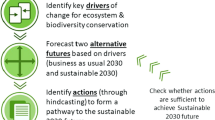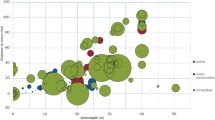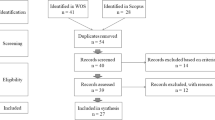Abstract
Coastal fishing communities are closely linked to the biological and ecological characteristics of exploited resources and the physical conditions associated with climate and ocean dynamics. Thus, the human populations that depend on fisheries are inherently exposed to climate variability and uncertainty. This study applied an ethno-oceanographic framework to investigate the perceptions of fishers on climate and ocean change to better understand the impacts of climate change on the coastal fishing communities of the South Brazil Bight. Seven coastal fishing communities that cover the regional diversity of the area were selected. Fishers were interviewed using a semi-structured questionnaire. The results suggest that fishers have detected climate-related changes in their environment such as reduced rainfall, increased drought events, calmer sea conditions, increases in air and ocean temperatures, changes in wind patterns and shoreline erosion. The perceptions of the fishers were compared to the available scientific data, and correlations were found with rainfall, wind speed and air and ocean temperatures. New hypotheses were raised based on the perceptions of fishers about sea level, coastal currents and sea conditions such as the hypothesis that the sea has become calmer. These perceived changes have positive and negative effects on the yields and livelihoods of fishers. The present work is the first evaluation of the perceptions of fishers on climate and ocean change and brings new understandings of climate-fishery-human interactions as well as provides inputs for future adaptation plans.




Similar content being viewed by others
References
Alfredini P, Arasaki E, Pezzoli A et al (2014) Exposure of Santos Harbor metropolitan area (Brazil) to wave and storm surge climate changes. Water Qual Expo Health 6:73–88
Allison EH, Bassett HR (2015) Climate change in the oceans: human impacts and responses. Science 350:778–782
Allison EH, Ellis F (2001) The livelihoods approach and management of small-scale fisheries. Mar Policy 25(5):377–388
Allison EH, Perry AL, Badjeck MC et al (2009) Vulnerability of national economies to the impacts of climate change on fisheries. Fish and Fisheries 10:173-196.
Andrachuk M, Armitage D (2015) Understanding social-ecological change and transformation through community perceptions of system identity. Ecol Soc 20(4):26
Angulo RJ, Souza MC, Muller ME (2009) Forecast and consequences of a new inlet opening at Mar do Ararapira, southern Brazil. Quater Environ Geosci 01(2):67–75
Aswani S, Vaccaro I, Abernethy K et al (2015) Can perceptions of environmental and climate change in island communities assist in adaptation planning locally? Environ Manag 56(6):1487–1501
Belkin IM (2009) Rapid warming of large marine ecosystems. Prog Oceanogr 81:207–213
Bell JD, Cheung W, De Silva S et al (2016) Impacts and effects of ocean warming on the contribution of fisheries and aquaculture to food security. In: Laffoley D, Baxter JM (ed) Explaining ocean warming: causes, scale, effects and consequences. IUCN, Gland, Switzerland, pp 409–435
Berkes F, Berkes MK, Fast H (2007) Collaborative integrated management in Canada’s north: the role of local and traditional knowledge and community-based monitoring. Coast Manag 35:143–162
Bezerra DMM, Nascimento DM, Ferreira EN et al (2012) Influence of tides and winds on fishing techniques and strategies in the Mamanguape River estuary, Paraíba state, NE Brazil. Ann Acad Braz Sci 84(3):775–787
Cavalcanti IFA, Ferreira NJ, Silva MGA, Dias MAF (2009) Tempo e Clima no Brasil. Oficina de textos, São Paulo, Brazil
Cheung WWL, Lam VWY, Sarmiento JL et al (2010) Large-scale redistribution of maximum fisheries catch in the global ocean under climate change. Glob Change Biol 16(1):24–35
Chou SC, Lyra A, Mourão C et al (2014) Assessment of climate change over South America under RCP 4.5 and 8.5 downscaling scenarios. Am J Climate Change 3:512–525
Church JA, Clark PU, Cazenave A et al (2013) Sea level change. In: Stocker TF, Qin D, Plattner G-K et al (eds) Climate change 2013: the physical science basis. Cambridge University Press, Cambridge
Climanálise (1986–2016) Boletim de monitoramento e análise climática. CPTEC/INPE. http://climanalise.cptec.inpe.br/~rclimanl/boletim/. Accessed 14 Oct 2017
Coelho CAS, Cardoso DHF, Firpo MAF (2015) Precipitation diagnostics of an exceptionally dry event in São Paulo, Brazil. Theor Appl Climatol 1:16
Coelho-Souza SA, López MS, Guimaraes JRD et al (2012) Biophysical interactions in the Cabo Frio upwelling system, southeastern Brazil. Braz J Oceanogr 60:353–365
Contente RF (2013) Padrões ecológicos locais e multidecadais da ictiofauna do estuário Cananéia-Iguape. PhD Thesis, University of São Paulo, Brazil
Davidson-Hunt IJ, Berkes F (2003) Nature and society through the lens of resilience: toward a human-in-ecosystem perspective. In: Berkes F, Colding J, Folke C (eds) Navigating social-ecological systems: building resilience for complexity and change. Cambridge Press, Cambridge, pp 53–82
Diegues AC (2006) Artisanal fisheries in Brazil. Samudra Monograph, ICSF, Rome
Dufek AS, Ambrizzi T (2007) Precipitation variability in Sao Paulo state, Brazil. Theor Appl Climatol 1:1–12
Ford JD, Smit B, Wandel J, MacDonald J (2006) Vulnerability to climate change in Igloolik, Nunavut: what we can learn from the past and present. Polar Record 42(221):127-138.
Fuentes EV, Bitencourt DP, Fuentes MV (2013) Análise da velocidade do vento e altura de onda em incidentes de naufrágio na costa brasileira entre os estados do Sergipe e do Rio Grande do Sul. Rev Bras Meteorol 28(3):257–266
Gasalla MA, Diegues ACS (2011) People’s seas: “ethno-oceanography” as an interdisciplinary means to approach marine ecosystem change. In: Ommer R, Perry I, Cochrane KL, Cury P (eds) World fisheries: a social-ecological analysis. Wiley-Blackwell, Oxford, pp 120–136
Gattuso J-P, Magnan A, Billé R et al (2015) Contrasting futures for ocean and society from different anthropogenic CO2 emissions scenarios. Science 349:aac4722
Grant S, Berkes F (2007) Fisher knowledge as expert system: a case from the longline fishery of Grenada, the eastern Caribbean. Fish Res 84:162–170
Harari J, França CAS, Camargo R (2013) Long-term variability of tidal and mean sea level components on the Brazilian coast. Braz J Geophys 31:49–52
Hartmann DL, Klein TAMG, Rusticucci M et al (2013) Observations: atmosphere and surface. In: Stocker TF, Qin D, Plattner G-K et al (eds) Climate change 2013: the physical science basis. Cambridge University Press, Cambridge
Hobday AJ, Pecl GT (2014) Identification of global marine hotspots: sentinels for change and vanguards for adaptation action. Rev Fish Biol Fisher 24:415–425
Hobday AJ, Bell JD, Cook TR et al (2015) Reconciling conflicts in pelagic fisheries under climate change. Deep-Sea Res II 113:291–300
Hobday AJ, Cochrane K, Downey-Breedt N et al (2016) Planning adaptation to climate change in fast-warming marine regions with seafood-dependent coastal communities. Rev Fish Biol Fisher 8:177–214
Huntington HP (2000) Using traditional ecological knowledge in science: methods and applications. Ecol Appl 10:1270–1274
Jahan I, Ahsan D, Farque MH (2015) Fishers’ local knowledge on impact of climate change and anthropogenic interferences on Hilsa fishery in South Asia: evidence from Bangladesh. Environ Dev Sustain 19(2):461–478
Machado IC, Fagundes L, Henriques MB (2015) Multidimensional assessment of sustainability extractivism of mangrove oyster Crassostrea spp. in the estuary of Cananéia, São Paulo, Brazil. Braz J Biol 75:670–678
Mahiques MM, Burone L, Figueira RCL et al (2009) Anthropogenic influences in a lagoonal environment: a multiproxy approach at the Valo Grande mouth, Cananéia-Iguape system. Braz J Oceanogr 57:325–337
Marengo JA, Jones R, Alves LM, Valverde MC (2009) Future change of temperature and precipitation extremes in South America as derived from the PRECIS regional climate modeling system. Int J Climatol 29:2241–2255
Maru YT, Smith MS, Sparrow A et al (2014) A linked vulnerability and resilience framework for adaptation pathways in remote disadvantaged communities. Glob Environ Chang 28:337–350
McTaggart-Cowan R, Bosart LF, Davis CA et al (2006) Analyses of Hurricane Catarina. Mon Weather Rev 134:3029–3053
Nicholls RJ, Cazenave A (2010) Sea-level rise and its impact on coastal zones. Science 328:1517–1520
Nursey-Bray M, Pecl GT, Frusher S et al (2012) Communicating climate change: climate change risk perception and rock lobster fishers, Tasmania. Mar Policy 36:753–759
Passos AC, Contente RF, Abbatepaulo FV et al (2013) Analysis of fish assemblages in sectors along a salinity gradient based on species, families and functional groups. Braz J Oceanogr 61(4):251–264
Pereira OM, Machado IC, Henriques MB, Yamanaka N (2001) Crescimento da ostra Crassostrea brasiliana semeada sobre tabuleiro em diferentes densidades na região estuarino- lagunar de Cananéia-SP (25°S, 48°W). B Inst Pesca 27(2):163–174
Pezza AB, Simmonds I (2005) The first South Atlantic hurricane: unprecedented blocking, low shear and climate change. Geophys Res Lett 32L:15712
Pinho PF, Marengo JA, Smith MS (2015) Complex socio-ecological dynamics driven by extreme events in the Amazon. Reg Environ Chang 15:643–655
Postuma FA, Gasalla MA (2010) On the relationship between squid and the environment: artisanal jigging for Loligo plei at São Sebastião Island (248S), southeastern Brazil. ICES J Mar Sci 67:1353–1362
Rahman MK, Schmidlin TW (2014) The perception and impact of natural hazards on fishing communities of Kutubdia Island, Bangladesh. Geogr Rev 104(1):71–86
Resgalla CJ, Brasil ED, Salomao LC (2007) The effect of temperature and salinity on the physiological rates of the mussel Perna perna (Linnaeus 1758). Braz Arch Biol Techn 50:543–556
Roy T, Bopp L, Gehlen M et al (2011) Regional impacts of climate change and atmospheric CO2 on future ocean carbon uptake: a multimodel linear feedback analysis. J Clim 24:2300–2318
Seixas ARC, Hoeffel JLM, Renk M et al (2014) Perception of fishermen and shellfish producers on global environmental changes in the northern coast of São Paulo state, Brazil. JICZM 14(1):51–64
Shelton C (2014) Climate change adaptation in fisheries and aquaculture: compilation of initial examples. FAO Fisheries and Aquaculture Circ. 1088, FAO, Rome
Siegle E, Calliari LJ (2008) High-energy events and short-term changes in superficial beach sediments. Braz J Oceanogr 56(2):149–152
Silva C, Albernaz-Silveira R, Nogueira PS (2014) Perceptions on climate change of the traditional community Cuiaba Mirim, Pantanal wetland, Mato Grosso, Brazil. Clim Chang 127:83–92
von Storch H (2014) Storm surges: phenomena, forecasting and scenarios of change. Procedia IUTAM 10:356–362
Zhang J, Fleming J, Georicke R (2012) Fishermen’s perspectives on climate variability. Mar Policy 36:466–472
Acknowledgements
We thank CNPq for the scholarship, and the GULLS project (Belmont Forum research initiative) for the opportunity to interact and collaborate with international experts. Sincere gratitude to all fishers who kindly collaborated with the study.
Funding Information
Thanks are given to FAPESP for funding the research.
Author information
Authors and Affiliations
Corresponding author
Electronic supplementary material
ESM
(DOCX 138 kb)
Rights and permissions
About this article
Cite this article
Martins, I.M., Gasalla, M.A. Perceptions of climate and ocean change impacting the resources and livelihood of small-scale fishers in the South Brazil Bight. Climatic Change 147, 441–456 (2018). https://doi.org/10.1007/s10584-018-2144-z
Received:
Accepted:
Published:
Issue Date:
DOI: https://doi.org/10.1007/s10584-018-2144-z




